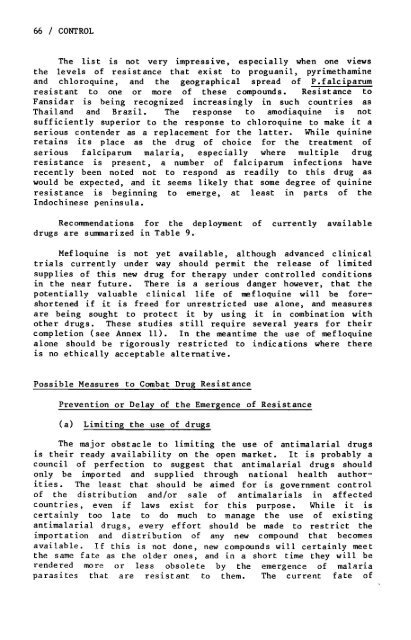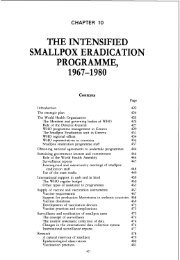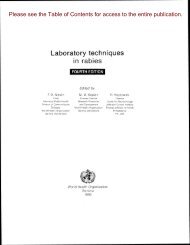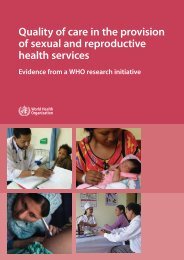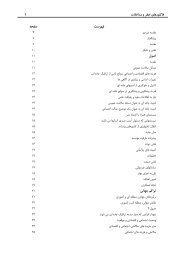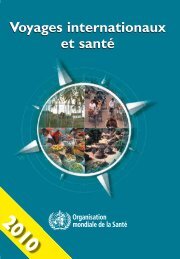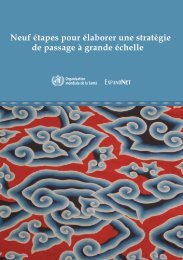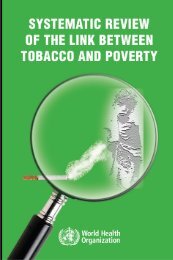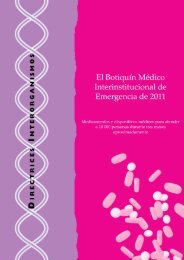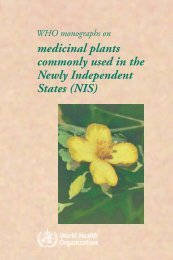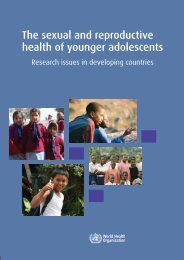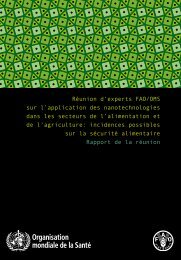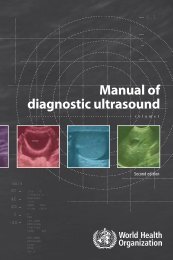Drug-Resistant Malaria - libdoc.who.int - World Health Organization
Drug-Resistant Malaria - libdoc.who.int - World Health Organization
Drug-Resistant Malaria - libdoc.who.int - World Health Organization
Create successful ePaper yourself
Turn your PDF publications into a flip-book with our unique Google optimized e-Paper software.
66 / CONTROL<br />
The list is not very impressive, especially when one views<br />
the levels of resi st ance that exist to proguanil, pyrimethamine<br />
and chloroquine, and the geographical spread of P.falciparum<br />
resistant to one or more of these compounds. Resistance to<br />
Fansidar is being recognized increasingly in such countries as<br />
Thailand and Brazil. The response to amodiaquine is not<br />
sufficiently superior to the response to chloroquine to make it a<br />
ser~ous contender as a replacement for the latter. While quinine<br />
retains its place as the drug of choice for the treatment of<br />
serious falciparum malaria, especially where mUltiple drug<br />
resistance is present, a number of falciparum infections have<br />
recently been noted not to respond as readily to this drug as<br />
would be expected, and it seems likely that some degree of quinine<br />
resistance is beginning to emerge, at least ~n parts of the<br />
Indochinese peninsula.<br />
Recommendations for the deployment of currently available<br />
drugs are summarized ~n Table 9.<br />
Mef loquine is not yet avai lab le , al though advanced c Hnical<br />
trials current ly under way should permit the release of limited<br />
supplies of this new drug for therapy under controlled conditions<br />
in the near future. There is a serious danger however, that the<br />
potentially valuable clinical life of mefloquine will be foreshortened<br />
if it is freed for unrestricted use alone, and measures<br />
are being sought to protect it by using it in combination with<br />
other drugs. These studies still require several years for their<br />
completion (see Annex 11). In the meantime the use of mefloquine<br />
alone should be rigorously restricted to indications where there<br />
is no ethically acceptable alternative.<br />
Possible Measures to Combat <strong>Drug</strong> Resistance<br />
Prevention or Delay of the Emergence of Resistance<br />
(a) Limiting the use of drugs<br />
The major obstac le to limiting the use of antimalarial drugs<br />
is their ready availability on the open market. It is probably a<br />
council of perfection to suggest that antimalarial drugs should<br />
only be imported and supplied through national health authorities.<br />
The least that should be aimed for is government control<br />
of the distribution and/or sale of antimalarials in affected<br />
countries, even if laws exist for this purpose. While it ~s<br />
certainly too late to do much to manage the use of existing<br />
antimalarial drugs, every effort should be made to restrict the<br />
importation and distribution of any new compound that becomes<br />
available. If this is not done, new compounds will certainly meet<br />
the same fate as the older ones, and in a short time they will be<br />
rendered more or less obsolete by the emergence of malaria<br />
parasites that are resistant to them. The current fate of


